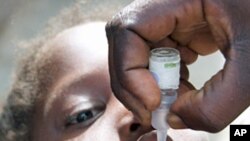At least two cases of polio and more than 100 cases of paralysis have been reported in Congo-Brazzaville in the past month. Authorities are launching a nationwide vaccination campaign to stem the outbreak.
At least two cases of polio have been confirmed in Congo-Brazzaville over the past month, but Guido Borghese, the principal advisor for child survival and development for the United Nations Children's Fund's West and Central Africa office, says it is possible the outbreak is much more widespread.
"We have the confirmation yesterday that at least there are two cases that have been confirmed, but there are a total of 120 cases of paralysis [and] 58 deaths have been reported," said Borghese. "And these cases have not yet been confirmed, but it is possible that likely they will be also caused by the polio virus. But I repeat, that to-date, only two cases have been confirmed among the 120 cases."
Borghese said that these cases are occurring in young adults ages 15 to 25, and no children have so far been reported as having the virus.
"What is important to know is that this epidemic is not concerning children," he said. "The people that are affected by the epidemic are young adults over the age of fifteen, and apparently, these people fifteen years ago were not immunized, because the situation of the country was quite unstable. And vaccination campaigns were not carried out fifteen years ago. So these people are not vaccinated and are vulnerable to the polio virus."
Though the cases are focused in Congo-Brazzaville, specifically in the city of Pointe-Noire, Borghese said the virus may have been imported from neighboring countries such as the Democratic Republic of Congo or Angola.
The government and international partners are planning to launch a nationwide vaccination campaign, and UNICEF has contributed $3.3 million to provide vaccines for residents up to the age of 30. The campaign is scheduled to start on November 11.
UNICEF officials warn the population to follow safe food and water practices, and added that people traveling to the area should be vaccinated.
Polio Outbreak in Congo-Brazzaville Hits Young Adults




